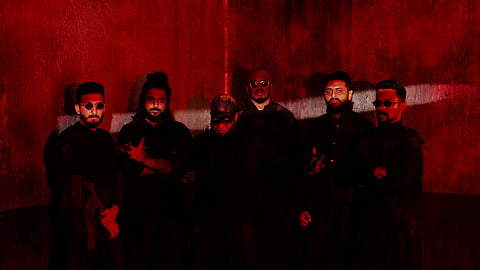

For many, ‘metal’ conjures only loud music, a rebellious attitude and dark clothes. But for The Down Troddence, metal is more than these stereotypes; it is a tool of artistic exploration of intense topics. With a history of almost 15 years, blending different genres and layered compositions, TDT has recently released their new album AYAKTIHIS (As You All Know, This Is How It Is), on February 20.
Hailing from Kannur, Kerala, the band moved to Bengaluru in 2011. Ever since, TDT has been challenging norms and pushing boundaries through a fusion of sounds that resonate deeply within the Indian metal scene. Back in the mid-2000s, when access to Western music was not prominent, the band found its core members. What started as a bedroom jamming project evolved into their first song Death Vanity, and later with the lineup, including Kerala state award winner and renowned music director Sushin Shyam, TDT released their album How Are You? We Are Fine, Thank You in 2013.
When asked about the long window between the albums, the lead vocalist of the band, Munz, says, “To write music is a completely different process. Nezher, the bassist and Sushin, the keyboardist, are music directors. Over the past 10 years, they would have written 200-300 songs for their projects. It’s not because we can’t write music. It’s just that when we come together as a band and try to write music, it has to mean something, so it takes time. Writing songs for the new album started in 2014.”
While metal is often associated with aggression, TDT’s music has a refreshing blend of metal with other genres like Carnatic, jazz and electronica. “As musicians, we are growing, blending and learning constantly with influences. 60 per cent of the things might be metal, the rest of them are different influences,” says Munz on the new album.
At the same time, the band’s political stance is evident with themes they deal with, primarily surrounding current political concerns; one such song is Ejjathi, which talks about casteism. “Metal is a very powerful medium for conveying as it deals with extreme emotions. And extreme emotion requires extreme music. That’s why I’m growling,” Munz adds.
Munz also recounts how there was no discrimination back in 2006-2015 when the band moved to the city. The support the band received from old-school and new school music was phenomenal, further allowing the band to grow. “We are grateful for the platform Bengaluru has given us; there were so many venues and gigs happening,” he recalls. What sets them apart is how their breaking of stereotypes is an ever-evolving process. Their album names are an example of how they enjoy breaking the stereotype inside the metal scene by not adhering to typical names seen in the genre.
Now, with the release of AYAKTIHIS, their message is louder than their music – metal is not just about sound but also substance. “Any art for that matter should move people to think differently. But that is not the only purpose of art,” says Munz, adding, “We can be nice people and play extreme music. We can have fun and still talk about serious things.”